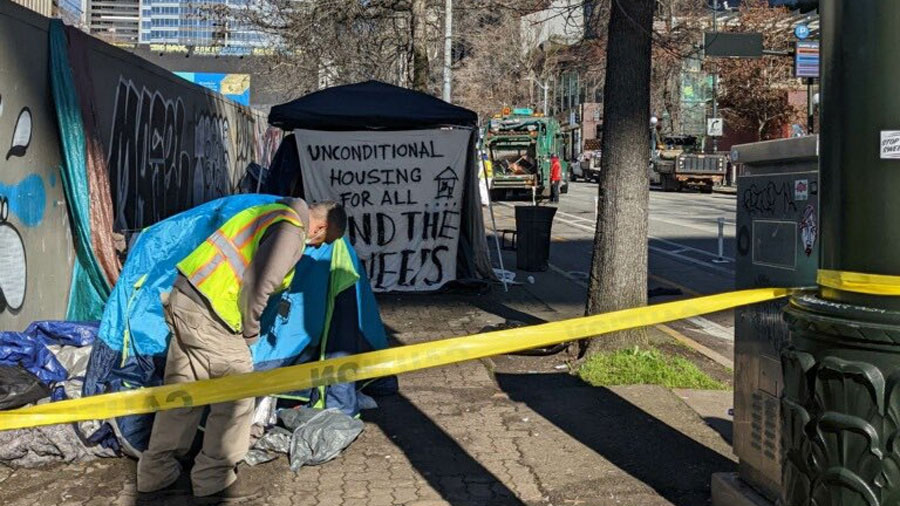Seattle requests KC Homelessness Authority to shrink budget by $21M
May 16, 2024, 9:44 AM

A homeless encampment outside Seattle City Hall getting removed on Wednesday. (Photo courtesy of Seattle City Council member Tammy Morales)
(Photo courtesy of Seattle City Council member Tammy Morales)
The City of Seattle requested the King County Regional Homelessness Authority (KCRHA) to cut its budget by $21 million compared to last year’s spending.
The $21 million is a 19% decrease from last year and, according to The Seattle Times, could potentially eliminate about 300 emergency shelter beds and a 125-bed shelter for Black men in the Central District among a loss of behavioral health services or beds at tiny home villages.
More on King County homelessness: Homelessness surges in King County by 23% as state releases plan to tackle housing
A spokesperson for Mayor Bruce Harrell explained to The Seattle Times the budget reduction is because temporary funding, retrieved through pandemic relief aid, has expired.
KCRHA’s point-in-time homeless count
Moments before KCRHA’s budget was slashed per the Seattle City Council’s request, the organization conducted a point-in-time (PIT) homeless count. A PIT count is an estimate of people experiencing sheltered and unsheltered homelessness on a single night in King County.
The main count of people living unsheltered is conducted by approximately 600 volunteers spread across the county between 2 a.m. and 6 a.m., assisted by paid “guides” who have experienced homelessness in the past and whose knowledge can help locate homeless people off the beaten path.
According to the PIT count conducted earlier this week, the number of people experiencing homelessness in King County, the most populated county in Washington, has gone up 23% since 2022. There were 9,810 unsheltered people (60%) and 6,575 sheltered people (40%) for a total of 16,385 in 2024. However, KCRHA said the numbers are a severe undercount.
In comparison, there were 7,685 unsheltered people (57%) and 5,683 sheltered people (43%) for a total of 13,368 in 2022.
KCRHA’s financial troubles
KCRHA laid off nearly 40 members of the team — approximately one-third of its total staff — in September 2023 after a pilot project from the organization, called Partnership for Zero, was sunsetted. The goal of the Partnership for Zero initiative was to get nearly everyone who was homeless in downtown Seattle off of the streets within a year. For the initiative’s 18-month lifespan, KCRHA claimed it has housed more than 230 people within downtown and the Chinatown International District through the program.
Last year, it was reported that 30 KCRHA employees earned six-figure salaries, with former CEO Marc Dones topping the list with a $250,000 annual salary. The deputy CEO was the only other employee to top $200,000 as an annual salary.
The roles varied among the highest paid within the Homeless Authority, ranging from communication directors, directors of policy, account managers, program managers and assistants to chief administrative officers, all making anywhere from $113,000 to $160,000.
More on KCRHA: KC Homeless Authority has salaries released after Dones departs
The average salary of all King County employees is just under $95,000 in comparison.
Under Dones leadership, the Homeless Authority requested nearly $12 billion for its budget to address local homelessness over the next five years, a dramatic increase over its initial $253 million budget for 2023.
The proposal’s budget broke down to two parts: $8.4 billion for one-time capital costs over the five-year period and an additional $3.4 billion for operating expenses. The request immediately received pushback from council members, private organizations and residents.
“If money was the solution, wouldn’t we have solved this 20 years ago?” Andrea Suarez, founder and executive director of We Heart Seattle, asked Dave Ross in response to KCRHA’s multi-billion dollar budget request. “Every major city keeps getting more millions and billions of dollars. Meanwhile, we can set up 20,000 beds in New York City for refugees that are coming in from Ukraine, with services, toilets, bathrooms, medical care, and nurses … it’s a bit different when you’re dealing with drug addiction and that is what KCRHA doesn’t address at all.”
Dones stepped down from his role as KCRHA’s CEO after two years just months after KCRHA made its $12 billion budget request. According to The Stranger, Dones had a strained relationship with city and county leadership in part due to Dones’ resistance to Seattle’s tiny home strategy — adopted in 2015. Just months into the job as CEO, Dones told PubliCola the “proliferation” of tiny houses needs to end, and that short-term approaches for housing should be replaced by new investments in housing construction and acquisition, citing King County’s Health Through Housing program.
More on KCRHA: Volunteer group lambasts King County Regional Homeless Authority’s ballooning budget
The KCRHA has projected that the number of homeless people in King County will reach 62,000 people by 2028, nearly 10,000 more compared to 2022.
Frank Sumrall is a content editor at MyNorthwest. You can read his stories here and you can email him here.













